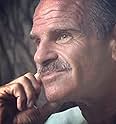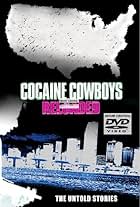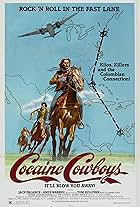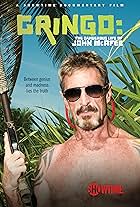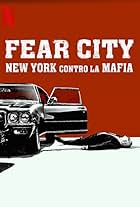VALUTAZIONE IMDb
7,7/10
14.384
LA TUA VALUTAZIONE
"In questo documentario i protagonisti del traffico di cocaina nella Miami degli anni '70 e '80, raccontano come hanno trasformato la città con i loro ""affari""..""In questo documentario i protagonisti del traffico di cocaina nella Miami degli anni '70 e '80, raccontano come hanno trasformato la città con i loro ""affari""..""In questo documentario i protagonisti del traffico di cocaina nella Miami degli anni '70 e '80, raccontano come hanno trasformato la città con i loro ""affari"".."
Bob Palumbo
- Self - Special Agent, Drug Enforcement Administration
- (as Bob Palombo)
Joseph Davis
- Self - Former Chief Medical Examiner, Miami-Dade County
- (as Dr. Joseph Davis)
Louis Caruso
- Self - Criminal Defense Attorney
- (as Louis Casuso)
Jorge Ayala
- Self - Enforcer
- (as Jorge 'Rivi' Ayala)
Recensioni in evidenza
I not only saw the documentary, I lived it, I became a Metro Dade county police officer in Aug of 1980 and retired in 2002, I was on the scene of at least half the drug related killings pictured in the video, and a whole lot more that were not. As if that weren't enough, I also went to High school with the quintessential Cocaine Cowboy Mickey Munday, oddly enough I didn't make the connection till I watched this video 50 something years later, I recall him as a redheaded nerd who the girls wanted nothing to do with, if they had only known that one day he would be buying entire neighborhoods and burying trash bags full of 20s and hundreds.
Although I had the opportunity to see the unfinished version of what is sure to be an award-winning film, I was thoroughly impressed by Cocaine Cowboys. Without giving anything away, let me just say that this film refrains from the type of overly preachy or overly glorified view of the cocaine business in the late 1970's and 1980's. A nice balance of character analysis mixed with an abundance of archival data kept my interest throughout the experience...and I walked out of the theater feeling as though I really learned a great deal, not only about historical occurrences, and their impact on a few central characters or society as a whole; rather, I left the cinema with a grasp of the time period from many different perspectives: Columbian drug lords, Cocaine transporters and dealers, special task force members assigned to find the aforementioned groups, local media then and now, land developers, vacationers, car salesmen, and your average Miamian. Perspectives offered were not limited in scope. I highly recommend this film.
A very stylized documentary, for a very stylized period of time, Cocaine Cowboys takes us into the world of Miami between 1970 and 1980. Using plush diversions with still images The Kid Stays in the Picture made popular, Cocaine Cowboys shows the immense changes Miami went through as it discovered the drug cocaine. Primarily interviewing three of the main names during this drug and blood soaked era, this film delves into a world filled with money, women and more importantly cocaine. As the film informs us, the Colombian Cartel made over ten billion dollars during their escapades in the Miami area, not only for themselves, but for the Americans helping them distribute.
The characters that are being interviewed, including an inmate captured for over twenty murders, never so much as flinch as they describe in detail, brutal murders. It is truly fascinating to listen to these criminals, two of which were released from prison, reminisce their achievements within crime organizations. This documentary does lack some of the more interesting comparisons director Billy Corben does brag about in his advertising for the film. Saying that it is the true story behind Scarface and Miami Vice, Cocaine Cowboys barely touches on these comparisons, and seems to bring the most interest from these brief allegories.
Despite this small short coming, the rest of the film is entertaining and educational, especially for a native Floridian like myself. I never really knew how large this business was in Miami until I watched this true rendition of the over fantasized films it claims to be the inspiration for. Explaining allot of what the American government will look away from, due to hefty drug money profits, does put a perspective on its true intentions, be it accepting drug money, ammunition money, or any type of blood money.
The characters that are being interviewed, including an inmate captured for over twenty murders, never so much as flinch as they describe in detail, brutal murders. It is truly fascinating to listen to these criminals, two of which were released from prison, reminisce their achievements within crime organizations. This documentary does lack some of the more interesting comparisons director Billy Corben does brag about in his advertising for the film. Saying that it is the true story behind Scarface and Miami Vice, Cocaine Cowboys barely touches on these comparisons, and seems to bring the most interest from these brief allegories.
Despite this small short coming, the rest of the film is entertaining and educational, especially for a native Floridian like myself. I never really knew how large this business was in Miami until I watched this true rendition of the over fantasized films it claims to be the inspiration for. Explaining allot of what the American government will look away from, due to hefty drug money profits, does put a perspective on its true intentions, be it accepting drug money, ammunition money, or any type of blood money.
I never could have guessed how intricate the cocaine industry was at this time. I was born post the cocaine era so I did not know how incredibly different the laws were during that time. This documentary gives so much insight into this high-speed world of drugs. I loved how the director allowed the members involved to tell their stories; however I wish that he had let them tell all of their stories & it was kind of jumpy when moving a narration when moving from one involved member to another would help the transition to be better understood. But now I'm hooked I wished that some of the involved members had not passed away because I have got to know more the system was so complex I want to know how it all works.
Anyone familiar with the story of Pablo Escobar and the Medellin Cartel will know how the mass manufacturing and distribution of cocaine turned Colombia into a war zone, with top politicians and judges routinely assassinated, and gang wars spilling violence onto the streets on a daily basis. Billy Corben's documentary Cocaine Cowboys focuses on the effect the most fashionable drug of the 80s had on Miami, which was the main entry point for masses of imported cocaine. Soon enough, the city once seen as the holiday spot for retired old folks was turned into the richest place in the world, with luxury car dealerships and expensive jewellery shops popping up all over, and of course, lots and lots of banks. The sudden boom was all down to cocaine consumption, and this came with a heavy price.
Corben tells the story using a variety of interviews, news reports, archive footage and photographs, lending a voice to everyone from smugglers, enforcers, politicians and law enforcement. The most fascinating insight is given by pilots Jon Roberts and Mickey Munday, who decided to get into the drug trade early on, making an unfathomable fortune in the process. They offer entertaining anecdotes about their experiences, and were making so much money that they lived in little fear of getting caught, even buying their own airports to import the goods in complete secrecy. Roberts and Munday were just regular guys who never dreamed that they could ever become so wealthy, and made sure to enjoy the high-life while it lasted. The main threat came from the cartel itself, which was so powerful and far-reaching that one foot out of line and you were dead, often by way of horrific torture.
The film's final third focuses heavily on the 'Cocaine Wars' that became so out-of-hand and brazen that it led to military intervention. This segment is told through the recollections of the deceptively charming inmate Jorge 'Rivi' Ayala, a former hit-man for crime family matriarch Griselda Blanco - known as the 'Godmother' - a woman capable of unspeakable cruelty and brutality. If she didn't like your face, you were a goner, and often entire families, including young children, were wiped out in order to leave no witnesses. It's a mind-blowing tale of how one drug can have such a devastating effect on a country, and it's told in a fast-paced, almost coked-up fashion, with the clever use of subtle animation to make stills feel alive, and a wealth of shocking and revealing archive footage to paint a clear picture of a city in crisis. A 'Reloaded' edition was released in 2014, which adds over 30 minutes of footage and provides updates on some of the subjects. I've seen both, and the original, shorter version tells a much tighter story.
Corben tells the story using a variety of interviews, news reports, archive footage and photographs, lending a voice to everyone from smugglers, enforcers, politicians and law enforcement. The most fascinating insight is given by pilots Jon Roberts and Mickey Munday, who decided to get into the drug trade early on, making an unfathomable fortune in the process. They offer entertaining anecdotes about their experiences, and were making so much money that they lived in little fear of getting caught, even buying their own airports to import the goods in complete secrecy. Roberts and Munday were just regular guys who never dreamed that they could ever become so wealthy, and made sure to enjoy the high-life while it lasted. The main threat came from the cartel itself, which was so powerful and far-reaching that one foot out of line and you were dead, often by way of horrific torture.
The film's final third focuses heavily on the 'Cocaine Wars' that became so out-of-hand and brazen that it led to military intervention. This segment is told through the recollections of the deceptively charming inmate Jorge 'Rivi' Ayala, a former hit-man for crime family matriarch Griselda Blanco - known as the 'Godmother' - a woman capable of unspeakable cruelty and brutality. If she didn't like your face, you were a goner, and often entire families, including young children, were wiped out in order to leave no witnesses. It's a mind-blowing tale of how one drug can have such a devastating effect on a country, and it's told in a fast-paced, almost coked-up fashion, with the clever use of subtle animation to make stills feel alive, and a wealth of shocking and revealing archive footage to paint a clear picture of a city in crisis. A 'Reloaded' edition was released in 2014, which adds over 30 minutes of footage and provides updates on some of the subjects. I've seen both, and the original, shorter version tells a much tighter story.
Trama
Lo sapevi?
- QuizBlanco was killed by two gunmen on a motorcycle as she walked out of a butcher shop in her hometown, Medellín, on September 3, 2012. The Miami Herald cites El Colombiano newspaper reports that one man fired two bullets into her head, executing her in the type of "motorcycle assassination" she has been credited with inventing.
- Citazioni
Griselda Blanco: [Last Title card] Griselda Blanco was released from prison on June 6, 2004.
- ConnessioniFeatures Scarface (1983)
I più visti
Accedi per valutare e creare un elenco di titoli salvati per ottenere consigli personalizzati
- How long is Cocaine Cowboys?Powered by Alexa
Dettagli
Botteghino
- Lordo Stati Uniti e Canada
- 150.056 USD
- Fine settimana di apertura Stati Uniti e Canada
- 36.295 USD
- 29 ott 2006
- Lordo in tutto il mondo
- 167.078 USD
- Tempo di esecuzione1 ora 58 minuti
- Colore
Contribuisci a questa pagina
Suggerisci una modifica o aggiungi i contenuti mancanti

Divario superiore
By what name was Cocaine Cowboys (2006) officially released in India in English?
Rispondi




